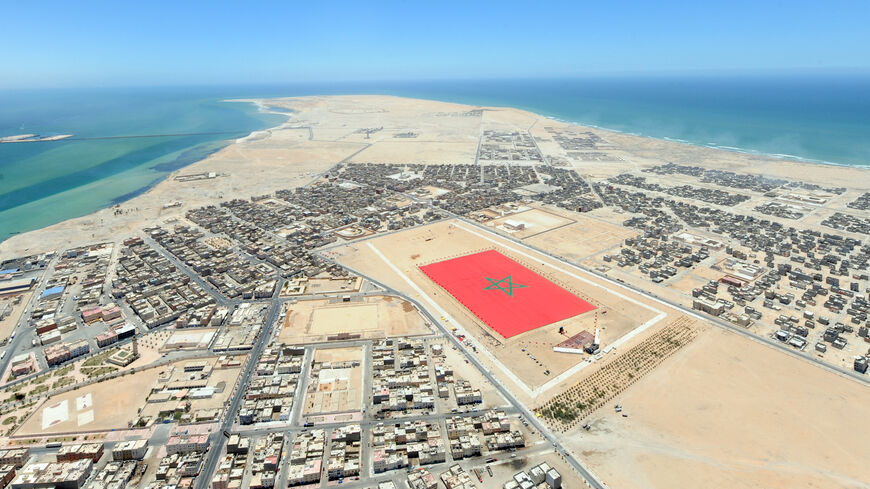Israeli-Moroccan diplomatic and security relations are expected to deepen on the backdrop of the announcement on Monday of Israel recognizing Morocco’s sovereignty over the Western Sahara region.
A few hours before the publication of the statement, the Israeli army appointed a first military attaché to Morocco. The new attaché to Rabat - Col. Sharon Itach - is of Moroccan origin.
Since the signing of both the Abraham Accords in December 2020 and of an agreement for bilateral security cooperation in November 2021, security and intelligence ties between Israel and Morocco keep expanding.
Bruce Maddy-Weitzman, professor emeritus at Tel Aviv University and senior researcher at the Moshe Dayan Center for Middle Eastern and African Studies, told Al-Monitor that the past two years have seen a quantum leap in Israel-Morocco relations, particularly in security, and the two states are developing an alliance.
"Over the decades before the normalization of ties, there have always been security and intelligence relations, including between the Mossad and Moroccan counterparts, so we are not starting from scratch," Maddy-Weitzman said. "On the contrary, Israel now helps building the capabilities of the Moroccan army, and this angers Algeria immensely. We have a sort of arms race with Morocco, the United States and Israel on the one hand, and Algeria, Russia and Iran on the other."
Omer Dostri, a senior researcher at the Jerusalem Institute for Strategy and Security, spoke with Al-Monitor about the two countries' desire to expand strategic cooperation ties in the face of their strong security and diplomatic interests.
Dostri said that one common interest to both Israel and Morocco is the threat from Iran and Hezbollah. For Israel, enlisting as many countries to the anti-Iran/anti-Hezbollah camp is clearly a diplomatic priority, and for the past six years, Morocco has been showing signs of joining, for its own reasons.
In fact, for the past six years, Moroccan security agencies have been accusing the Western Sahara separatist Polisario movement of links with Hezbollah and Iran. Director of Morocco’s Central Bureau of Justice Investigations Habboub Cherkaoui told Israel's i24 News last March: "Since 2017, Iran has been supporting the separatist Polisario front via Hezbollah and with the help of Algeria. This Iranian support is a source of destabilization for the Kingdom of Morocco."
Polisario connections
Morocco has been pointing the finger at Iran and Hezbollah for allegedly arming Polisario. In parallel, Morocco has been accusing Iran of attempting to spread the Shiite doctrine in the largely-Sunni country.
Algeria’s support of Polisario also places Morocco and Israel in the same diplomatic and security camp. Since the signing of the Abraham Accords, Algeria has been accusing Israel partially of the American decision to recognize the Moroccan sovereignty over the Western Sahara. It is in part the reason why Algeria has been fighting, together with South Africa, against the African Union accepting Israel as observer to the 55-state organization. The Polisario condemned Monday evening the Israeli recognition of the Moroccan sovereignty, blaming Morocco of betraying the Palestinian cause.
Dostri distinguishes three fields of expanding security ties between Israel and Morocco: intelligence cooperation, joint military drills, and arms and technology trade.
Israel and Morocco have been discreet over their intelligence cooperation, but less discreet on cooperation between their armies. Last June, the Israel Defense Forces (IDF) sent a delegation of troops to participate in a major US-led military drill held in Morocco. It was the first time Israeli soldiers participated in this regional drill, dubbed “African Lion.” Dostri said he expects Israeli participation in more such drills with Morocco as the two countries' ties grow stronger. According to Dostri, the IDF is especially interested in joint maritime drills.
Bilateral security trade is also strong. Over the past two years, Morocco purchased a variety of weapons from Israel, including intelligence drones and "suicide drones" used for attacks.
For instance, in February 2022, Globes newspaper reported on a $500 million deal, where Israel Aerospace Industries will provide Morocco with its advanced Barak MX air and missile defense system. Israel’s army uses the Barak system mostly from maritime platforms (military ships), but it seems that the system set to be sold to Morocco would be adapted for either land or air platforms. The newspaper explained that negotiations for the deal were launched in 2021, with the signing of the security cooperation agreement.
Another example was the September 2022 purchase by Morocco from the Israel-based BlueBird Aero Systems company at least 150 WanderB and ThunderB vertical takeoff and landing unmanned aircraft to bolster its air defense capabilities. A portion of these unmanned aircraft will be apparently built in Morocco, according to Infrodron, a Spanish news platform.
In June, director of the International Defense Cooperation Directorate of the Israeli Defense Ministry, Yair Kulas, told Calcalist newspaper that his government was in talks with two countries for the potential sale of Israel-manufactured Merkava armored vehicles. Kulas did not specify which two countries, but reports in Europe later on revealed that Cyprus and Morocco are the two states negotiating the purchase of the Israeli tank. The Israeli Merkava tanks have never been sold by the Israeli army to any other country. If these reports are confirmed, Morocco’s army could become the first outside the IDF to operate these advanced tanks.
Cyber technology
Morocco is interested not only in Israeli weapons, but also in Israeli cyber technology. According to a June 2020 report by Amnesty International, Moroccan authorities had installed the Israeli-developed NSO Pegasus spyware on the phone of human rights activist and journalist Omar Radi. NSO is indeed a private company, but the export of such technologies to Morocco would have required a license by Israel’s Defense Ministry.
"The various arms deals between Israel and Morocco amount to hundreds of millions of dollars. Obviously, we are nowhere near the expected deal between Israel and Germany for the purchase of the Arrow 3 system, but Morocco is becoming a significant buyer for the Israeli security industries," Dostri said.
"That being said, beyond the financial aspect, what's more important is the diplomatic and security rapprochement between Jerusalem and Rabat. It is unprecedented, in Israel’s relations with Arab states — and it reflects the common interests, or threats, shared by both countries, namely Iran and Hezbollah," he added.
Maddy-Weitzman agrees. "The decision to normalize again diplomatic relations with Israel was first and foremost motivated by the deal reached with the Trump administration to recognize the Moroccan sovereignty over the Western Sahara, but it also toed in line with the vision by Moroccan financial and security elites, viewing Israel as a desired partner in a variety of fields. Whether reports on Iran and Hezbollah really assisting militarily the Polisario are accurate or not, the motivation for a security partnership with Israel is definitely there," he said.
‘’We don’t yet know if there is any quid pro quo for this act [the Israeli recognition]. At some point, though, one can expect that the long delayed next meeting of the Negev Forum will be held in Morocco, with Israel’s participation of course. One can also expect that at some point, formal diplomatic relations will be upgraded to the ambassadorial level, which Israel very much wants,’’ noted Maddy-Weitzman. The appointment of a first military attaché, he argued, indicates possible upgrading also on the security level.








